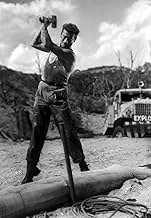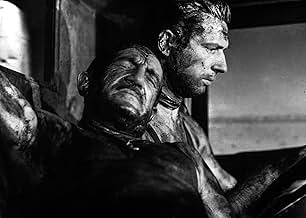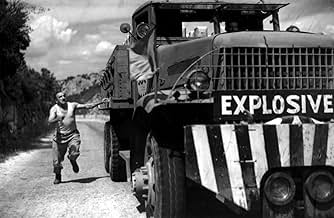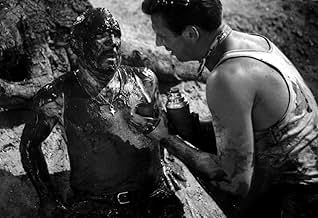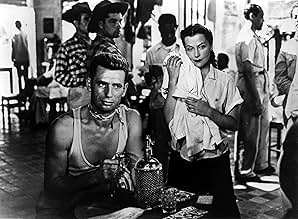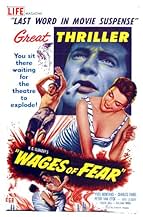In a decrepit South American village, four men are hired to transport an urgent nitroglycerine shipment without the equipment that would make it safe.In a decrepit South American village, four men are hired to transport an urgent nitroglycerine shipment without the equipment that would make it safe.In a decrepit South American village, four men are hired to transport an urgent nitroglycerine shipment without the equipment that would make it safe.
- Director
- Writers
- Stars
- Won 1 BAFTA Award
- 6 wins & 1 nomination total
Peter van Eyck
- Bimba
- (as Peter Van Eyck)
Véra Clouzot
- Linda
- (as Vera Clouzot)
Darío Moreno
- Pepito Hernandez
- (as Dario Moreno)
Antonio Centa
- Camp Chief
- (as Centa)
Charles Fawcett
- Bradley
- (uncredited)
- Director
- Writers
- All cast & crew
- Production, box office & more at IMDbPro
Summary
Reviewers say 'The Wages of Fear' is a gripping film about desperation and survival, with intense suspense and masterful direction by Henri-Georges Clouzot. Critics praise Yves Montand and Charles Vanel's performances and the exploration of human resilience. Some find the initial setup slow and criticize the portrayal of the American oil company. Despite this, the film is celebrated for its innovative cinematography and thematic depth.
Featured reviews
You're living in a barren, beaten land, in South America where the lost and lonely band, no way to pay for your escape, the barrels bottom is all you scrape, this ain't the dream that had been promised, or been planned. Then your offered a way out, a chance to flee, there's a price to pay but soon you could be free, if you drive a laden lorry, you can wrap yourself in glory, $2000 you'll receive as the payee.
If only driving a wagon a few hundred miles was all there was to it. A fantastic piece of film making that demonstrates how far people can sink and what boundaries they're prepared to cross to extricate themselves from those depths.
If only driving a wagon a few hundred miles was all there was to it. A fantastic piece of film making that demonstrates how far people can sink and what boundaries they're prepared to cross to extricate themselves from those depths.
My title is not an exaggeration. If you thought OJ Simpson's slow speed chase was insane, you need to change the batteries in your pacemaker and check out "Wages of Fear". This 1953 French classic tells the story of a bunch of guys who are stuck in a squalid South American village--a sort of Casablaca-esque purgatory--and will do anything to get out, even if it means getting themselves blown sky high. Slow and lazy for the first half (deliberately), the plot eventually reveals itself to be about a suicide mission to haul a zillion gallons of nitroglycerine across 300 miles of harsh terrain that would make the Coyote & Roadrunner take an early retirement.
Yes, nitro is that stuff that you don't want to look at the wrong way or it may send you to the moon. "Wages of Fear" ultimately reveals itself to be a gripping character study of how people keep their wits, or come unravelled, when subjected to pure terror... with of course the reward of heaven dangling just out of reach. So again we see this subtle allegory of purgatory, hell and heaven which I'm sure was the intent of director Henri-Georges Clouzot.
An interesting point of historical note is that when this film was released in the USA, around 15 minutes of its 150 min running time were cut. According to the Criterion mini-documentary "Censored", these cuts were largely due to the "anti-American" themes (the tyrannical oil corporation that exploits the lives of locals for the sake of a buck) as well as subtle themes of spiritual cynicism (the beautifully poetic "fence" monologue which symbolizes the absence of God/afterlife). By today's standards these censored scenes are prime time tv, but back in the 50s this movie was feared by US censors as being godless pinko propaganda. That might put a smirk on your face as you're watching this flick. But definitely look for the full 150ish minute version of this film, not the 130 min censored cut.
But really, for the entire second half there will be no smirking, only tense gritting of teeth as you watch these rolling nuke trucks inch across the South American jungle. The hazards they encounter, as well as their ingenious attempts to survive them, are extremely creative and expertly filmed with the sort of suspense that would make Hitchcock lose his breath.
Content advisory stuff: There's a scene in the beginning where a fine tarantula specimen gets squashed. After rewinding and rewatching the scene in slo-mo a dozen times, I'm almost certain that our unfortunate arachnid was a fake prop. If anyone knows differently please mention it in a review. The same scene shows a naked woman from behind, at a distance. Later in the film is a scene that shows a topless native woman from a distance--it's very artistic. Language is tame throughout the movie with maybe 1 or 2 instances of "merde" (the sh- word). While there is violence, none of it is shown explicitly on camera (some of it is disturbing, though). And unless you're a 1950s American censorship bureaucrat, there's nothing politically incendiary other than the notion that the almighty dollar is the root of much misery.
"Wages of Fear" is a well crafted, poetic, suspenseful film that certainly deserves its classic status in the history of cinema. Not unlike the classic Bogart/Lupino film "They Drive by Night" (1940), this film proves that a seemingly simple story about a bunch of truck drivers can really get your gears going.
Yes, nitro is that stuff that you don't want to look at the wrong way or it may send you to the moon. "Wages of Fear" ultimately reveals itself to be a gripping character study of how people keep their wits, or come unravelled, when subjected to pure terror... with of course the reward of heaven dangling just out of reach. So again we see this subtle allegory of purgatory, hell and heaven which I'm sure was the intent of director Henri-Georges Clouzot.
An interesting point of historical note is that when this film was released in the USA, around 15 minutes of its 150 min running time were cut. According to the Criterion mini-documentary "Censored", these cuts were largely due to the "anti-American" themes (the tyrannical oil corporation that exploits the lives of locals for the sake of a buck) as well as subtle themes of spiritual cynicism (the beautifully poetic "fence" monologue which symbolizes the absence of God/afterlife). By today's standards these censored scenes are prime time tv, but back in the 50s this movie was feared by US censors as being godless pinko propaganda. That might put a smirk on your face as you're watching this flick. But definitely look for the full 150ish minute version of this film, not the 130 min censored cut.
But really, for the entire second half there will be no smirking, only tense gritting of teeth as you watch these rolling nuke trucks inch across the South American jungle. The hazards they encounter, as well as their ingenious attempts to survive them, are extremely creative and expertly filmed with the sort of suspense that would make Hitchcock lose his breath.
Content advisory stuff: There's a scene in the beginning where a fine tarantula specimen gets squashed. After rewinding and rewatching the scene in slo-mo a dozen times, I'm almost certain that our unfortunate arachnid was a fake prop. If anyone knows differently please mention it in a review. The same scene shows a naked woman from behind, at a distance. Later in the film is a scene that shows a topless native woman from a distance--it's very artistic. Language is tame throughout the movie with maybe 1 or 2 instances of "merde" (the sh- word). While there is violence, none of it is shown explicitly on camera (some of it is disturbing, though). And unless you're a 1950s American censorship bureaucrat, there's nothing politically incendiary other than the notion that the almighty dollar is the root of much misery.
"Wages of Fear" is a well crafted, poetic, suspenseful film that certainly deserves its classic status in the history of cinema. Not unlike the classic Bogart/Lupino film "They Drive by Night" (1940), this film proves that a seemingly simple story about a bunch of truck drivers can really get your gears going.
In The Wages of Fear, four men in a remote South American town have the enviable task of transporting a metric buttload (technical term) of nitroglycerin across mountainous roads in poor condition. It's a taut, superbly suspenseful thriller, guided with a steady hand by director Henri-Georges Clouzot, who would go on to direct the classic Diabolique in 1955.
Yves Montand, in a rare dramatic role, plays Mario, the ostensible protagonist of our tale. He's been stuck in this backwater for some time, but it costs a lot of money to get out – plane fares are through the roof, and there's no train, and there's no neighboring village. In short, you're stuck there until you can buy a ticket – and pay for a passport, of course.
Mario spends his days looking for work, wooing tavern worker Linda, and despairing about the lack of work. There's an American oil company in town, but they're no longer hiring. His monotonous lifestyle is interrupted by the arrival of fellow expat Jo (Charles Vanel), a tough-looking older man who quickly wins Mario's favor at the expense of the rest of the men in town.
The oil company, in fact, has its own problem – one of their large derricks has exploded, causing a huge oil fire. Company man Bill O'Brien decides to send two trucks loaded with nitro from the town up the mountain to the derrick. (The eventual idea is to set off charges, which will somehow contain or extinguish the fire.) O'Brien has no trouble scaring up volunteers for the task, since the men of the town are largely unemployed. Four men will be selected to take the two trucks. Only one truck is needed; the second is truly just in case there's an accident with the first one. The men will receive $2000 when the work is finished, more than enough to secure passage out of the backwater.
Mario and Jo are chosen, as are Mario's roommate Luigi (Folco Lulli) and German expat Bimba (Peter van Eyck). The two trucks depart early in the morning, full of gas and of nitro. Danger awaits.
Theirs is not an easy task. The road is full of ruts. In one place, the wooden deck that trucks use to make a sharp turn up the mountain has been damaged from disuse. It's hot and muggy. And one has to be very, very careful, as even the smallest bump might set the whole shebang off. There's also tension among the four drivers – Luigi is unhappy that Mario is spending more time with Jo than with him, Mario is unhappy with what he perceives as Jo's cowardice. Bimba seems to get along with everyone, though.
The whole time I was watching this movie, I was certain not all four were going to make it. I will not spoil what is now a sixty-three-year-old movie, but I was still genuinely surprised by the ending. This ain't no fairy tale or sitcom. This is a movie about desperation, redemption, sacrifice, and comeuppance. It's not necessarily about justice.
The Wages of Fear is a singularly terrific movie from start to finish, exquisitely shot and expertly written. Its money maker is its tension, something present here in spades. The writing is impeccable; even personality changes make perfect sense within the film's context. There are intricacies within a straightforward plot. This is a must see for lovers of thrillers.
Yves Montand, in a rare dramatic role, plays Mario, the ostensible protagonist of our tale. He's been stuck in this backwater for some time, but it costs a lot of money to get out – plane fares are through the roof, and there's no train, and there's no neighboring village. In short, you're stuck there until you can buy a ticket – and pay for a passport, of course.
Mario spends his days looking for work, wooing tavern worker Linda, and despairing about the lack of work. There's an American oil company in town, but they're no longer hiring. His monotonous lifestyle is interrupted by the arrival of fellow expat Jo (Charles Vanel), a tough-looking older man who quickly wins Mario's favor at the expense of the rest of the men in town.
The oil company, in fact, has its own problem – one of their large derricks has exploded, causing a huge oil fire. Company man Bill O'Brien decides to send two trucks loaded with nitro from the town up the mountain to the derrick. (The eventual idea is to set off charges, which will somehow contain or extinguish the fire.) O'Brien has no trouble scaring up volunteers for the task, since the men of the town are largely unemployed. Four men will be selected to take the two trucks. Only one truck is needed; the second is truly just in case there's an accident with the first one. The men will receive $2000 when the work is finished, more than enough to secure passage out of the backwater.
Mario and Jo are chosen, as are Mario's roommate Luigi (Folco Lulli) and German expat Bimba (Peter van Eyck). The two trucks depart early in the morning, full of gas and of nitro. Danger awaits.
Theirs is not an easy task. The road is full of ruts. In one place, the wooden deck that trucks use to make a sharp turn up the mountain has been damaged from disuse. It's hot and muggy. And one has to be very, very careful, as even the smallest bump might set the whole shebang off. There's also tension among the four drivers – Luigi is unhappy that Mario is spending more time with Jo than with him, Mario is unhappy with what he perceives as Jo's cowardice. Bimba seems to get along with everyone, though.
The whole time I was watching this movie, I was certain not all four were going to make it. I will not spoil what is now a sixty-three-year-old movie, but I was still genuinely surprised by the ending. This ain't no fairy tale or sitcom. This is a movie about desperation, redemption, sacrifice, and comeuppance. It's not necessarily about justice.
The Wages of Fear is a singularly terrific movie from start to finish, exquisitely shot and expertly written. Its money maker is its tension, something present here in spades. The writing is impeccable; even personality changes make perfect sense within the film's context. There are intricacies within a straightforward plot. This is a must see for lovers of thrillers.
9dtb
Georges Arnaud's novel LE SALAIRE DE LA PEUR has been filmed twice, by Henri-Georges Clouzot as THE WAGES OF FEAR (1953) and by William Friedkin as SORCERER (1977). While both films are worth seeing, the earlier version is the one regarded as a classic, and rightly so. Although SORCERER goes into more detail about the political climate and the various misdeeds that led the four desperate protagonists to the South American hellhole where they accept high-paying but life-risking jobs driving nitroglycerin through treacherous terrain, WAGES... distinguishes the men's personalities better, giving the audience more rooting interest in them. Both films have excellent casts, with charismatic leads in Yves Montand (WAGES...) and Roy Scheider (SORCERER), plus WAGES... also provides feminine charm in the form of beguiling Vera Clouzot as the café waitress who loves Montand. Both films have tense action sequences as well, but somehow for all the staging and skillful editing, SORCERER's action scenes seem strangely slow, slogging along in the mud just like the protagonists in their less-than-state-of-the-art trucks. Both versions have enough good things in them to be worth a look, but if you only have the time and resources to check out one of them, it's WAGES... that really pays off!
Clouzot rarely gets the attention he deserves. He made not one, but two of the greatest thrillers of all time, 'Les Diaboliques' and 'The Wages Of Fear', both perfect examples of how to make genuinely suspenseful movies that build up an amazing amount of tension. Most so-called thrillers made in Hollywood these days are thrillers in name only and could learn a lesson or two from these movie classics. 'The Wages Of Fear' could even be described as an action movie, but it is a CHARACTER DRIVEN action movie, and that's what makes it so special. Modern audiences with MTV attention spans might find the plot a little slow, but I think the first half of the movie, which deals with the motley collection of exiles in a poor Latin American town, is not only fascinating in itself, but really makes a massive impact on the second half. By taking his time introducing the characters and exploring their relationships and possible motivations, Clouzet adds depth and meaning to the rest of the exciting story, something very rarely achieved in this type of movie since. The cast, every single one of them, are flawless. The four leads, Mario, the fairly decent guy played by yves Montand, his new best friend the shifty M. Jo (Charles Vanel), his old pal the kind hearted Luigi (Folco Lulli), and the enigmatic Bimba (Peter van Eyck), are all brilliant. Great performances, taut and imaginative direction, crisp and impressive cinematography, and a handful of the most riveting sequences ever committed to film make 'Wages Of Fear' a truly unforgettable experience. Suspense movies don't come much better than this! Simply a masterpiece.
Discover the nominees, explore red carpet fashion, and cast your ballot!
Did you know
- TriviaFilming began on 27 August 1951 and was scheduled to run for nine weeks. Numerous problems plagued the production, however. The south of France had an unusually rainy season that year, causing vehicles to bog down, cranes to fall over and sets to be ruined. Director Henri-Georges Clouzot broke his ankle. Véra Clouzot fell ill. The production was 50 million francs over budget. By the end of November, only half the film was completed. With the days becoming shorter because of winter, production shut down for six months. The second half of the film was finally completed in the summer of 1952.
- GoofsWhen Bimba is shaving in the cab of the truck, he has the right side of his face covered in shaving cream, but when he turns to talk to Luigi the right side of his face is clear of shaving cream.
- Alternate versionsThe film was cut for U.S. distribution in 1954, in part due to scenes that denounced crooked U.S. business interests in Latin America. The Criterion Collection laserdisc restored the film to its uncut version with 21 minutes of footage removed from other versions of the film.
- ConnectionsFeatured in Montand à la rencontre de Pagnol (1986)
- SoundtracksThe Blue Danube
Composed by Johann Strauss
Details
- Release date
- Countries of origin
- Languages
- Also known as
- El salario del miedo
- Filming locations
- Production companies
- See more company credits at IMDbPro
Box office
- Gross US & Canada
- $21,228
- Opening weekend US & Canada
- $7,633
- Dec 1, 2024
- Gross worldwide
- $22,326
- Runtime
- 2h 36m(156 min)
- Color
- Aspect ratio
- 1.37 : 1
Contribute to this page
Suggest an edit or add missing content

![Watch Trailer [English SUB]](https://m.media-amazon.com/images/M/MV5BNWU5Zjk4MDAtZDM1Ni00YzJmLTkyZTUtYjVhN2VjNzZmOGVhXkEyXkFqcGdeQXRyYW5zY29kZS13b3JrZmxvdw@@._V1_QL75_UX500_CR0)
